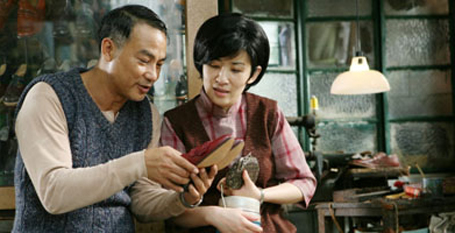
In 1988, Alex Lau began what would be a fruitful and lasting collaboration with writer Mabel Cheung in Painted Faces or 七小福, a biopic about the childhoods of Sammo Hung, Jackie Chan, and Yuen Biao in a Peking opera school. Easily one of the best films Law has made, Painted Faces was a rare nostalgic piece that evokes the pains and joys of growing up and working hard in Hong Kong in the 1960s. Without a heavy hand or unsubtle emotional manipulation, the film managed to turn on the water faucets quite well.
With Echoes of the Rainbow, Law and Cheung revisited Hong Kong in the 1960s, this time through the eyes of a working class family. The patriarch is Simon Yam, playing a humble shoemaker in a shophouse alley, while Sandra Ng plays the mother who never fails to get a bargain. Aarif Lee (surely a successor to the pretty boy post currently held by Wong Lee Hom) is their overachieving son and future prom king, while Chung Siu To plays the youngest son, a tyke with a penchant for shoplifting.
A series of events good and bad happen to the family members - such as Typhoon Betty, falling in love for the first time, having to pay protection money to both the gangs and the law, celebrating the mooncake festival, and so on. Despite the film’s episodic approach, there is a slow build-up of emotions, a kind of joyous nostalgia for the good old days that still acknowledges how bad the good old days were.
It’s not just a growing up story but rather a remembrance of what one’s experience with poverty, corruption, hardship and even class differences felt like. The film’s creators are able to look back at the past with a doubled view of innocence and experience, the nostalgia and wisdom of adulthood and the naivety of childhood. Their recollections of the past ring true also because of the restrained character of the script and direction, and their refusal to overplay the potential sentimentality inherent in this genre.
This is one film that certain filmmakers trying to make a career of making period pieces or pieces on the lower classes should really learn from.












 Printable Version
Printable Version










Reader's Comments
Be the first to leave a comment on this page!
Please log in to use this feature.